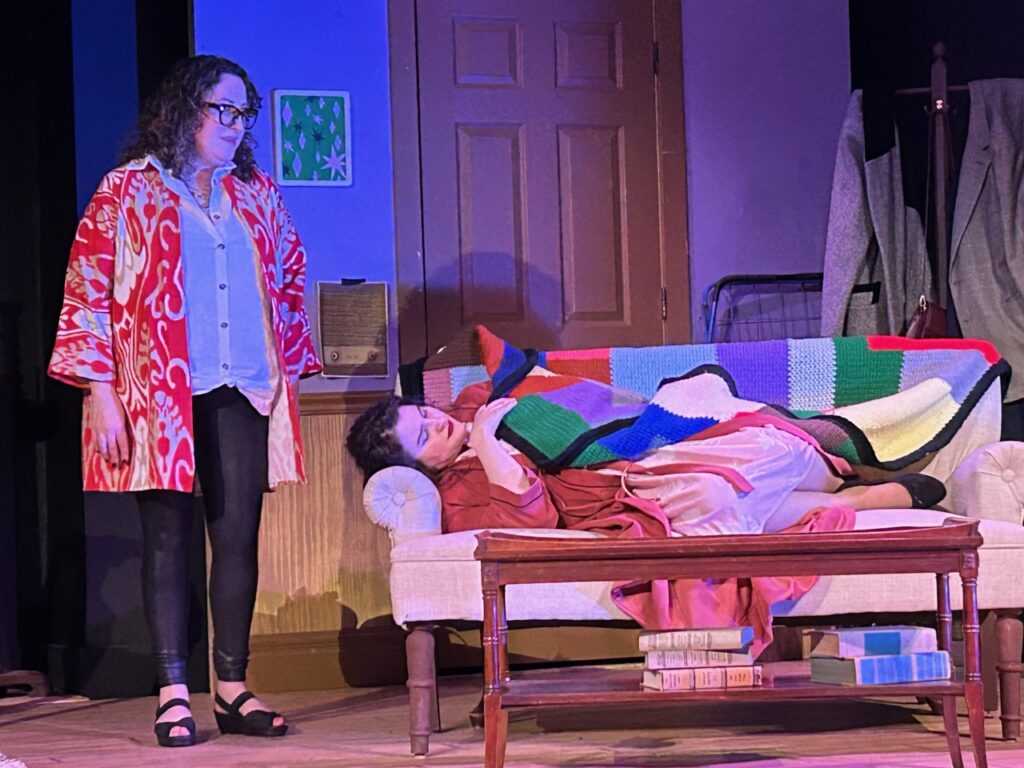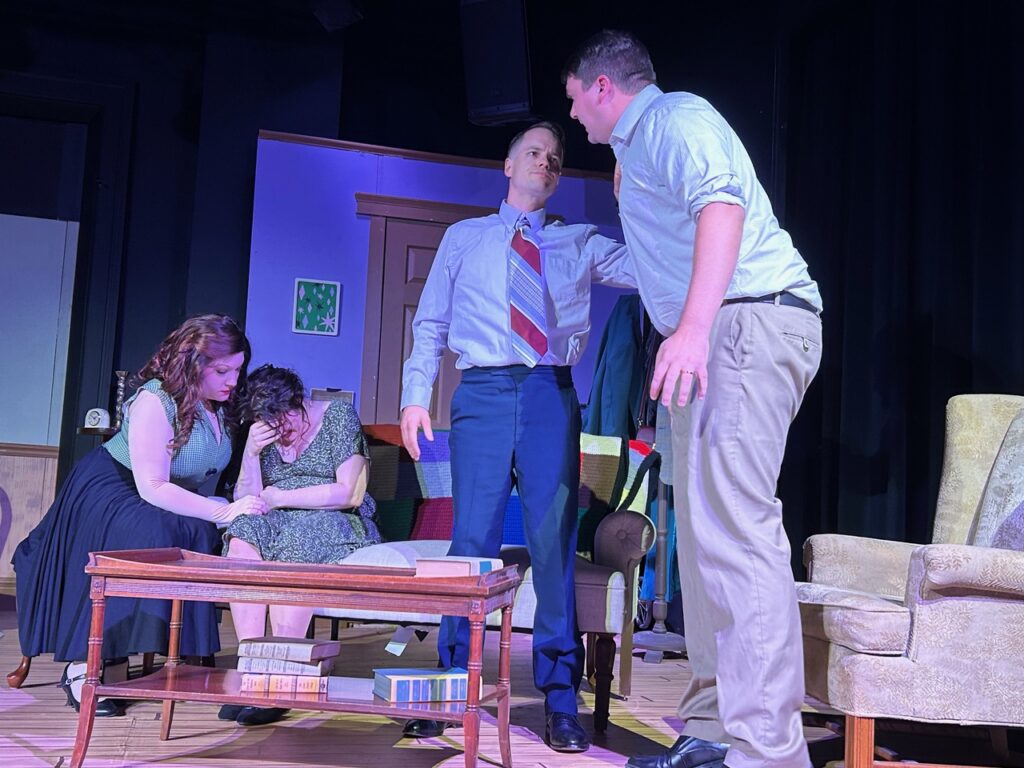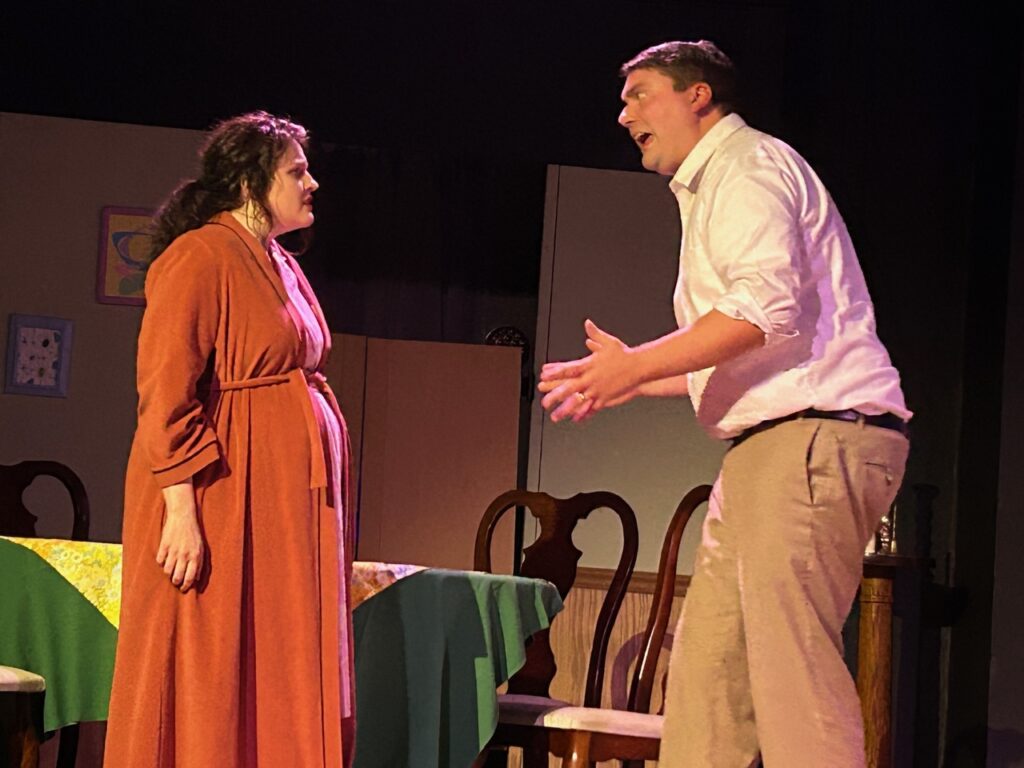By DAVID DUPONT
BG Independent News
“Jennifer’s Birth” opens by asking the audience to suspend disbelief in a major way.
Jennifer (Jordan Killam) the titular character rises from her lotus pose on a lush cushion positioned in front of the stage. She looks around amazed. As her therapist urged, she has returned to the world her parents lived in during the weeks before her birth.
“You got me here,” she exclaims. Jennifer explains that her new therapist “insists you have to go back to the time of your birth to find out why you’re so screwed up.”

And while this chronological sleight of hand is fantastic, what it reveals is reality, brutally honest reality.
“Jennifer’s Birth” by Rich Orloff is on stage at the Black Swamp Players’ theater at 115 East Oak St., in downtown Bowling Green, with shows Friday, July 12, and Saturday, July 13, at 8 p.m. and Sunday at 2 p.m. and continuing July 19 and 20 at 8 p.m., and July 21 at 2 p.m. Click for tickets.
Directed by Lane Hakel, “Jennifer’s Birth” is the winner of the Players’ third Telling Stories Playwriting Competition. Orloff’s work is well served by the Players, who show it is worthy for future productions.
The 57-year-old Jennifer is thrust back into her parents’ apartment in Rogers Park in Chicago during autumn, 1953.

At the kitchen table we meet her mother, Adele (Rin Moran) who is in the advanced stage of pregnancy. She appears weary and drawn. With her is her mother Pearl (Annelise Clifton), who lives with Adele and son-in-law Mel (Trevor Walsh). Mel is the provider. He co-owns two car dealerships with his brother. He always arrives home in a sour mood every night because of work or something he heard on the news. He expresses this at top volume in contrast to his wife who barely murmurs.
Even before Jennifer’s birth the household grows when Adele’s brother Lee (Garrett Monasmith) arrives home from Army service during the Korean War. He’d gone in to be a medic, hoping eventually to become a doctor. But, as Jennifer tells us, when they saw how strong he was they transferred him to the infantry. He saw hell, Lee says.
Adele’s family lives in the shadow of their Eastern European roots. Pearl believes the Cossacks are always about to return and wreak havoc. Adele was born in a field. A brother, who Jennifer had never heard of, died on the ship as they were bound for America.

Then Lee introduces his new gentile girlfriend, Connie (Skylar Tauber), who is decidedly not Jewish, though she says she will convert. This does not endear her to Pearl. “You can throw a tablecloth on an old table but, it’s still an old table,” she says — in Yiddish. With her knack for accent, Clifton can drive home the insult spoken in Yiddish even if you don’t understand the words.
When Connie attempts to learn some Yiddish, Pearl’s response is “now she can irritate me in Yiddish and English.”
But Lee insists they will marry go move to California that almost a foreign place where one can escape the constrictions of family and society. And eat oranges fresh from a tree, as Lee wants to do.
There are plenty of causes for laughter early on but the story that enfolds is heart-wrenching.
Jennifer is a ghostly presence as these secrets are revealed.She wonders: “What am I supposed to do with all this information?”

Mel is sexually frustrated. Adele says she can’t have any intimate relations while she’s pregnant. The problem goes deeper than that. And when he forces himself on her it threatens to shatter their already fragile marriage.
Adele is at the center of this story. She struggles to speak about her feelings, but no one, not even Connie whose revelations about her life are punctuated with exclamation marks.
For Pearl these things are best left unspoken, and that has warped her relationship with her daughter. Moran embodies the character of Adele. She moves with a weary stride. She has a sad gravity about her that pulls on the others in the household and, even 57 years after these events occurred, on her daughter.
Now Jennifer, who lives in California, is caught in a dilemma. Her mother is dying, yet she’s putting off visiting her. “My mother always fulfilled her responsibilities,” she said. “I can’t forgive her but I have no idea what to forgive her for.”
Without stinting on the emotional complexities, Jennifer does reach resolution. This ending is well-earned and welcomed while remaining true to the attitudes of the time. This family drama has the power to reach across the years to touch contemporary audiences.

